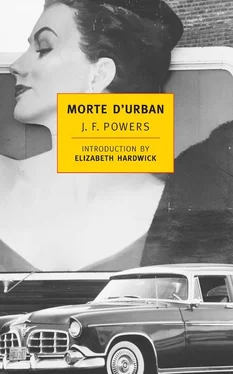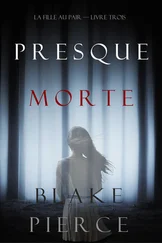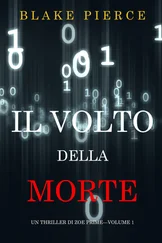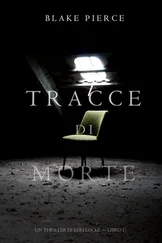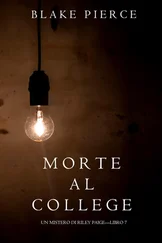It was Father Urban’s move in the other game — the one he was playing with Jack — and he made it: a bad one. Jack, of course, showed him no mercy. Father Urban sniffed. It occurred to him that Jack would have been an entirely different sort of person if he’d handled himself as he did his checkers. Jack could have been a big success in life — and not a very nice person to know. He certainly got back at the world in checkers.
Something was coming over the wall: “Hospital nun I knew in Omaha, she used to take all the baby Jesuses out of the cribs. Every floor had its own tree and crib. She put ’em all back on Christmas morning.”
Not good enough, Wilf. They wouldn’t be there on Christmas morning. They’d be out in parishes. Brother Harold could put the bambino back on Christmas morning, but it wouldn’t be the same thing, and Wilf knew it. Father Urban held to his strategy of silence.
More was coming over the wall: “Thanks to one little nun, everybody’s attention was focused on the true meaning of the time before Christmas — on the idea of waiting .”
Nobody else said anything. Jack, though he appeared apprehensive, was winning another game, and Brother Harold was puddling away at his work — to look at him , you’d think nothing was wrong — and Father Urban was waiting .
“It’s still Advent,” Wilf murmured, turning a page.
Father Urban sensed that Wilf had stolen a look at him.
Jack cleared his throat. “I see what you mean, Father,” he said, and cleared his throat again. “But I’ve been wondering if the shepherds should be present yet. Or even Mary and Joseph — in the attitudes we see them in, I mean. And the Magi. The animals, yes, but not running around in circles.” Thus spoke Jack to Wilf, who had let down the wall and now sat with it crushed in his lap, and for some moments thereafter both men were silent, each staring into space — while Father Urban asked himself what he was doing there. Why had he been cast into outer darkness, thrown among fools and failures? What star had led him to this?
“I don’t know that I ever thought of it like that,” Wilf said at last, in a groping voice. “He’s right, you know”—this to Father Urban who had taken no position in the matter, and took none now, but was determined to stop Wilf if, on the authority of Jack’s doctrine, it was now his intention to leave only the animals, and to immobilize them .
Wilf went over to the tree, knelt, and disconnected the crib, stopping the animals and shepherds in their tracks. But then, to Father Urban’s surprise, Wilf reached up into the branches of the tree and brought out the bambino and put it back where it belonged — and thus, though it might seem all was well now, they arrived at the moment Father Urban had been waiting for. He let it pass, however.
“ Thanks ,” he’d been going to say at that moment. “ Thanks ,” as he might have said it, would have been quite enough for him. But he had denied himself that pleasure, and if Wilf would just leave it at that, so would he. Wasn’t this the true meaning of Christmas? Joy to the world and peace to men of good will. It was hard, though — oh, very hard — to see someone having it both ways.
Wilf, having plugged in the crib, returned to his rocker. He picked up the paper, and then, boldly meeting Father Urban’s gaze, he said: “Just shows how wrong we can be sometimes.”
We! As if Father Urban had been wrong about anything! He glared at Jack, and stared him down, his eyes following Jack’s down to the checkerboard — where he saw a surprising opportunity. He was not forgetting Wilf, but he would deal with Jack first. With his only king, Father Urban jumped this way and that, taking a dreadful toll of Jack’s black men.
“Why didn’t I see that?” said Jack. Something in his tone, and, on second thought, the easiness of the conquest on the board, suggested to Father Urban that Jack had indeed seen it, had planned it, had offered himself and his black men for sacrifice. Thereupon, though he didn’t like what Jack had done, the desire to deal with Wilf died in Father Urban. In a way, he was sorry.
Father Urban, and perhaps Wilf and Brother Harold, too, sensed the rare peace now reigning among them, but Jack rejoiced in it visibly. Still, a moment later, it was Jack who broke the spell. “You know, Urban, I don’t feel right about those animals,” he said — not, Father Urban knew, to be critical but just to be saying something. For a moment, they had all been lifted up, and this was Jack’s way of letting them down lightly to earth, where they had to live. “I’ve always understood that what heat there was at Bethlehem came from the animals. By rights, they should be closer to the Holy Family. Of course, I realize that’s not possible in this case.”
Father Urban looked over at the tree, at the hamper of food and liquor there. “Let’s open one of Billy’s bottles,” he said.
6. SAILING AGAINST THE WIND
EARLY IN THE afternoon on Christmas, after a good meal with Phil Smith, pastor of St Monica’s, Great Plains, Father Urban got on the train for Duesterhaus, tired. There had been a midnight Mass at St Monica’s, followed by a series of nightcaps with Phil, so that it was two-thirty before they turned in. Father Urban had risen early, had preached at all Masses, and preached well, but now he was paying. The coach was overheated, as usual, and probably the heavy meal, too, was having a bad effect on him. He would have liked some privacy, but he went to a double seat at the end of the coach because Wilf and Jack would be getting on at Olympe and wouldn’t understand if he sat apart from them. He had something to discuss with Wilf, too. After showing the conductor his pass, he must have fallen asleep, for the next thing he knew Wilf and Jack were sitting across from him and the conductor was leaving — having, it seemed, given Wilf a receipt for Jack’s fare.
Jack was in trouble. He had lost his wallet. Or at least his wallet — containing miscellaneous slips of paper (nothing, though, that would enable the finder to return the wallet to its owner), money (about $1.25, Jack thought), and one of the two Minnesota Central passes — was missing. Two wallets, in fact, were missing, for Father Chmielewski, the pastor where Jack helped out, had presented him with a new one for Christmas. “I was sorry I didn’t have anything for him.”
“Be that as it may,” said Wilf. When was the last time Jack had seen his wallet?
The new wallet Jack had seen the evening before, just as they were sitting down to eat, which was when Father Chmielewski had given it to him. Jack had put it in his left back pocket, he remembered, to distribute the weight, since he kept his old wallet in his right back pocket. Had Jack transferred the contents of the old wallet to the new one? No, he hadn’t. Then he couldn’t say that the old wallet had been in his possession at that time? No, as a matter of fact, he couldn’t. He could only assume that it was in its usual place. When was the last time Jack had seen his old wallet? Think . The last time Jack had seen his old wallet? Yesterday — yesterday on the train going to Olympe, if memory served him right. Think . Well, Jack hadn’t intended to mention this, but, well, there had been a little accident at the table the evening before. A cup of coffee had gone into his lap, not very hot coffee, fortunately, but enough (since it had cream in it) to necessitate a change of pants, these kindly lent him by Father Chmielewski, not a bad person, really, when you got to know him. Yes, yes. Had Jack seen his old wallet at that time? He had not. No? No. Father Chmielewski had turned Jack’s pants over to the housekeeper, a fine woman, and she had brought them back later that evening. Now had Jack seen his wallet — his old wallet — at that time? No, he hadn’t. He hadn’t seen either wallet at that time. Had he looked? No, he hadn’t. Why hadn’t he? He hadn’t thought to look, and even if he had, he would not have looked. The housekeeper was a very fine woman.
Читать дальше
